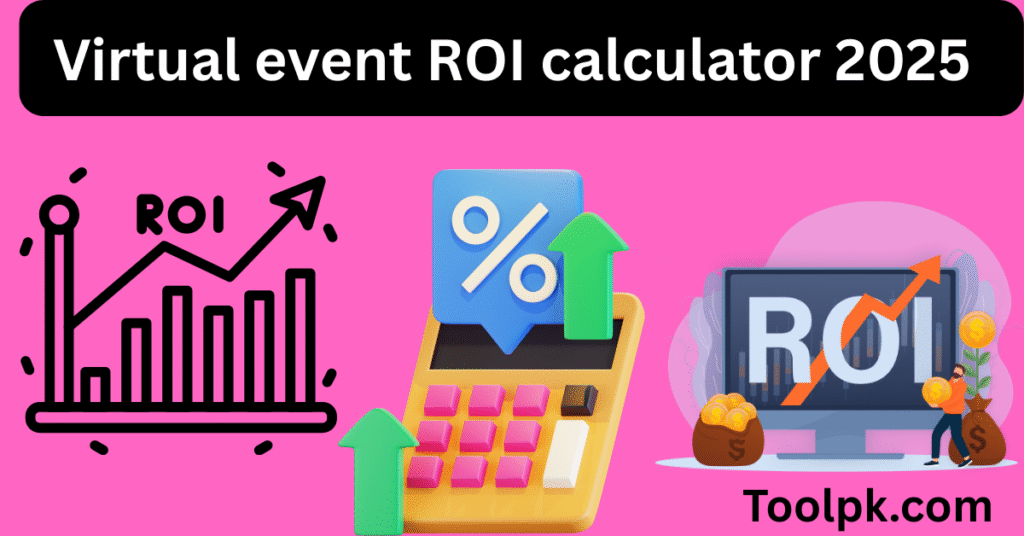Virtual event ROI calculator 2025
Virtual event ROI calculator 2025

🎯 Virtual Event ROI Calculator
August 2025 Edition
Calculate your virtual event return on investment with precision
💰 Event Investment
📈 Event Revenue
🔄 Scenario Comparison Tool
| Metric | Conservative | Optimistic | Current |
|---|
📄 Export & Reporting
🏆 Industry Benchmarking
Select an industry to see benchmark data
💡 ROI Optimization Tips for August 2025
Targeted Marketing
Use AI-powered audience segmentation for better conversion rates
Strategic Partnerships
Collaborate with complementary brands to share costs and expand reach
Mobile-First Experience
Optimize for mobile users who represent 70% of virtual event attendees
Interactive Content
Gamification and interactive sessions increase engagement by 40%
Real-time Analytics
Monitor engagement metrics to optimize content during the event
Follow-up Strategy
Automated nurture campaigns can increase post-event conversions by 25%
💝 Support This Tool
If this calculator helped you optimize your virtual event ROI, consider supporting its development!
Bank Details
Name: Majid Farooq
Bank: Habib Bank Limited
IBAN: PK40HABB0001947100292703
Country: Pakistan
Developed by Majid Farooq
📧 majidfarooq295@gmail.com
Virtual Event ROI Calculator 2025: Maximize Your Success
The future of events is here, and it’s more data-driven than ever. Are your virtual events truly paying off? In 2025, simply hosting a successful event isn’t enough; you need to prove its value. This is where a robust virtual event ROI calculator becomes your most powerful tool. Forget guesswork and manual spreadsheets. This guide will show you exactly how to measure, analyze, and boost your virtual event’s return on investment, transforming every event from an expense into a strategic asset.
What is a Virtual Event ROI Calculator?
A virtual event ROI calculator is a digital tool designed to quantify the financial and strategic success of an online event. Instead of just looking at ticket sales, it provides a comprehensive framework to compare the total costs of your event against its total value, including both monetary gains and intangible benefits.
Calculating virtual event ROI is crucial for proving your event’s value to stakeholders, optimizing your budget, and refining future strategies. It helps you move beyond vanity metrics—like the number of registrations—and focus on what truly impacts your business, from lead generation and sales to brand awareness and customer loyalty.
The New Rules of ROI in 2025
The landscape of virtual events has evolved significantly. In 2025, a simple formula of (Revenue – Cost) / Cost is no longer sufficient. Modern ROI measurement incorporates a blend of financial metrics and qualitative insights to provide a holistic view. A comprehensive virtual event ROI calculator takes into account:
- Financial Metrics: Direct revenue from ticket sales, sponsorships, and product sales.
- Lead Generation: The number of new leads, marketing-qualified leads (MQLs), and sales-qualified leads (SQLs) generated.
- Engagement and Satisfaction: Attendee engagement rates, post-event survey scores, and Net Promoter Score (NPS).
- Brand and Community Growth: Social media reach, website traffic spikes, and brand mentions.
Key Metrics for a Virtual Event ROI Calculator
To get an accurate picture of your event’s performance, you need to track the right data points. Here are the essential metrics to input into your virtual event ROI calculator:
1. Total Event Costs
This is the “investment” side of your ROI calculation. Be sure to include every single expense, no matter how small.
- Virtual event platform fees
- Speaker and talent fees
- Marketing and promotional costs (ads, email campaigns, etc.)
- Staff and production costs
- Software and technology subscriptions
2. Total Event Revenue
This is the “return” side. Account for all sources of income related to your event.
- Ticket sales and registration fees
- Sponsorships and exhibitor fees
- Revenue from product sales or demos
- Upsells and cross-sells generated during the event
3. Non-Monetary Value
This is the most critical part of modern ROI analysis. These metrics show how the event contributes to your long-term business goals.
- Lead Generation: Track new contacts added to your CRM, and their journey through the sales funnel. For more on tracking leads, check out this HubSpot guide to lead generation.
- Conversion Rate: The percentage of attendees who convert into customers, demo requests, or other desired actions.
- Brand Value: Quantify brand awareness through social media mentions, press coverage, and website traffic.
- Audience Engagement: Measure session attendance rates, live poll responses, and Q&A participation.
A Practical Virtual Event ROI Calculation
Let’s put this into practice with a simplified example.
| Item | Cost ($) |
| Virtual Platform Fees | 5,000 |
| Speaker Fees | 2,500 |
| Marketing & Ads | 3,000 |
| Staffing | 2,000 |
| Total Costs | 12,500 |
| Item | Value ($) |
| Ticket Sales (100 @ $50/ticket) | 5,000 |
| Sponsorship Revenue | 10,000 |
| Leads Generated (50 leads @ $200/lead) | 10,000 |
| Total Revenue/Value | 25,000 |
The Formula:
ROI = ((Total Value – Total Costs) / Total Costs) x 100
Calculation:
ROI = (($25,000 – $12,500) / $12,500) x 100
ROI = ($12,500 / $12,500) x 100
ROI = 100%
This means for every dollar invested, you gained a dollar in return. A positive ROI is a win, but the real power lies in understanding why you achieved that result and how to improve it for your next event.
Why Measuring Virtual Event ROI is a Game-Changer
Measuring your event’s ROI does more than just justify your budget. It provides actionable insights that can dramatically improve your event strategy.
- Optimize Your Budget: Pinpoint which expenses are generating the highest returns and which are a waste of resources.
- Improve Content Strategy: See which sessions had the highest engagement and drove the most conversions.
- Attract More Sponsors: Present a clear, data-backed case for why sponsors should invest in your event.
- Secure Future Funding: Use proven ROI to demonstrate your event’s direct contribution to business growth.
Ultimately, a virtual event ROI calculator 2025 is an essential tool for any marketing or event professional. It shifts the conversation from a qualitative discussion about “how it felt” to a quantitative one about “what it achieved.” For more insights on digital marketing trends, read this article on Search Engine Journal.
FAQ Section
Q1: How do I calculate the non-monetary value of leads?
A: To quantify the value of a lead, use your company’s average customer lifetime value (CLV) or lead-to-sale conversion rate. For example, if your average customer is worth $5,000 and your lead-to-sale conversion rate is 5%, each qualified lead is worth $250.
Q2: What is a good ROI for a virtual event?
A: A “good” ROI can vary significantly by industry and event goals. For many marketing events, a positive ROI is a success. An ROI of 300% or more is often considered excellent, as it means the event generated three times its cost in value.
Q3: Can a virtual event ROI calculator be used for hybrid events?
A: Yes. A comprehensive calculator can be adapted for hybrid events by including additional costs and revenue streams associated with the in-person component, such as venue rental, catering, and on-site staff.
Q4: How does brand awareness contribute to ROI?
A: Brand awareness contributes to ROI indirectly. Increased brand visibility and positive sentiment can lead to future sales and customer loyalty. Track metrics like social media mentions, website traffic, and press coverage to quantify this long-term value.
Q5: What are some common mistakes when calculating virtual event ROI?
A: Common mistakes include only tracking financial metrics, ignoring post-event follow-up conversions, and failing to set clear, measurable goals before the event. A holistic approach is key to an accurate calculation.
Q6: What’s the difference between simple ROI and incremental ROI?
A: Simple ROI is the most basic calculation and measures total revenue against total cost. Incremental ROI is more advanced and measures only the revenue that was directly generated by the event, excluding revenue that would have been earned regardless.
Q7: How can I improve my virtual event ROI?
A: To improve ROI, focus on high-quality, engaging content, strategic marketing to attract the right audience, and a robust post-event follow-up plan to nurture leads and drive conversions. Analyzing your ROI data will reveal specific areas for improvement.
Q8: Are there free tools to calculate virtual event ROI?
A: Yes, many event technology platforms and marketing blogs offer free downloadable templates or simple online calculators. While they may not be as detailed as a custom solution, they are an excellent starting point for basic ROI analysis.
Q9: What role does data analytics play in this process?
A: Data analytics is the backbone of modern ROI calculation. It allows you to track and interpret everything from attendee behavior and engagement to lead conversions, providing the raw data needed to populate your calculator and make informed decisions.
Q10: Why is it important to measure ROI in 2025?
A: In a competitive and rapidly changing digital landscape, proving the effectiveness of every marketing dollar is non-negotiable. Measuring ROI in 2025 is essential for justifying your budget, securing executive buy-in, and staying ahead of the curve.
Conclusion
Calculating your virtual event ROI is no longer a luxury—it’s a necessity. By leveraging a comprehensive virtual event ROI calculator 2025, you can shift your mindset from simply executing events to strategically investing in them. Understanding your event’s true value empowers you to optimize your strategy, secure future funding, and ultimately, drive tangible business growth. Start tracking your metrics today and turn your events into a profit center, not just a line item.
Ready to unlock the full potential of your virtual events? Share this guide with your team and get started on your own ROI calculation!

Hello Friends!
My name is Majid Farooq, reading books and gaining knowledge about Tools and their conditions is my passion and I am here to share my knowledge and experience with you. I hope it’s very helpful for you.
Thank you very much.